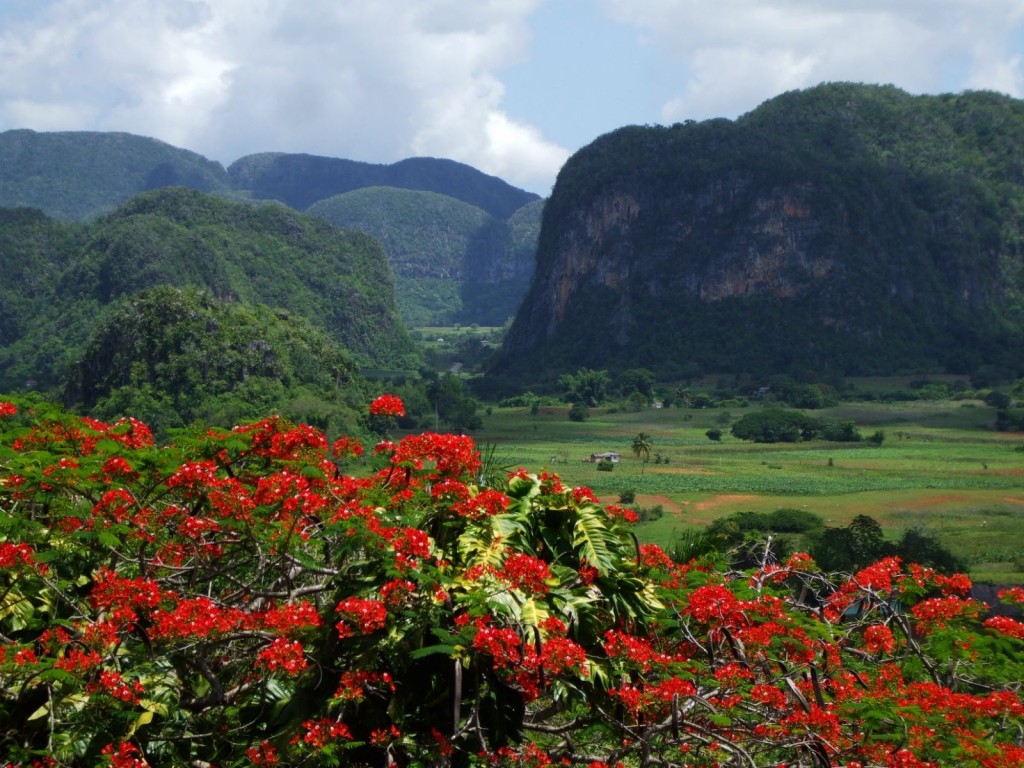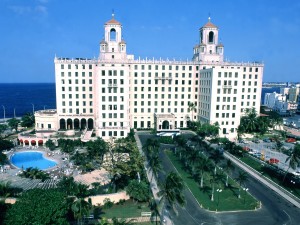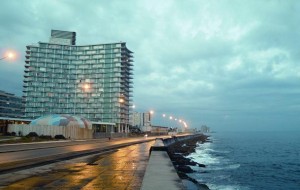SHORT HISTORY OF THE CUBAN HOTELS.
Retains the aura of an era. It has tradition and own label. The distinction, elegance and luxury combined with the effectiveness of services in a facility that over the years welcomed guests such as King Edward VIII of England; Ava Gardner and Marlon Brando, Graham Greene and García Márquez, Robert Redford and Steven Spielberg and many other celebrities, among which Alejo Carpentier, Maria Felix, Libertad Lamarque, Jorge Negrete, Pierre Cardin, Nat King Cole … Opened on December 30 1930, the most majestic and impressive of the island, Hotel Cuba is simply classic.
It stands on a rock at the entrance to the Havana neighborhood of El Vedado promontory, making it an obligatory point in the urban landscape of the capital, and that location, in what was the seat of the battery of Spanish cannons Santa Clara, makes from the hotel an unbeatable view of the city and the sea, with which it is integrated is enjoyment, as their front gardens project to leave city area as they look deep into the Gulf the backyards of this beautiful building that combines in its eclectic architecture and modern art deco is present and called Cuban colonial style.
300 artistic pieces of heritage value are shown in their classrooms. The Hall of Fame with portraits of the most famous hotel guests, promotes the historical tour of the facility. It had first-place events. A President of the Republic, it would be only for six hours, was sworn in light of a candle in one of its rooms (412) in 1934. It was the scene of the bloody battle of October 1933, when more than 400 officers removed from their commands were evicted from the hotel by gunfire by his former subordinates. And there was held in 1946, convened and chaired by Lucky Luciano, the big meeting of the American Mafia.
Hotel England
If the National Hotel is the flagship store of Cuban hotels, England is the hotel oldest of the island active. It opened on December 23, 1875 and can be proud to have welcomed a lengthy list of guests illustrious, from Winston Churchill, then an unknown lieutenant IV Hussars Regiment of His Majesty, who held his 21st birthday in Cuba and would become a top figure of the twentieth century to Sarah Bernhardt, famous French tragic that the words of Alexandre Dumas, He looked like a virgin and broom body and lived in that facility a torrid affair with the bullfighter Luis Mazzantini.
Much has been said about those loves; the years, however, blurred the details. It is said that she knew calibrate, above the set and costume matador lights, Mazzantini attributes and realized they could make him forget the bitterness of life and especially the weight of age. It is said that he went to see her perform in the Teatro Tacon and she was presented, in turn, in a bullfight. It also says that she saw him smoke in the restaurant of the Hotel Inglaterra and who dared to ask him to teach him to do it, but not in public. Classes, one night in the room of French and another in Spanish, lasted a whole week.
Draw attention inside that facility showy Seville tiles and sculptures marking Hispanic flavor and in its facade, the Creoles ornamental elements typical of the time of its construction.
The building of the Hotel Habana Riviera, in an excellent location on the seafront, is equally emblematic; one of the most representative of Cuban architecture 50. Notable also for works of art for the hotel made especially artists like Cundo Bermudez and Florencio Gelabert.
Hotel Riviera
For many, the Havana Riviera was, in Havana, the hotel mafia. Certainly, much of the capital required its building-more than 12 million dollars was provided by the Sicilian Mafia, who made his casino, the most luxurious of the ten existing in the Cuban capital. Meyer Lansky, the head of what “the rule of Havana” was called, was installed in a now defunct 20th floor suite and made this hotel their headquarters.
Slabs engraved on the second floor lobby, a symbol is repeated insistently. Three jars of different colors united by their base. Blue represents the power of heaven. The green, the power of money, while the red represents the power of the blood. It is, say sources that this reporter has not seen, the emblem of the family Genovesse.
In the Riviera Santo Trafficante, one of the leaders of the Mafia in Cuba and owner of the legendary cabaret Sans Souci Hotel Deauville and took refuge when, advanced and 1959, the expulsion of Cuba was imminent. Trafficante drag him Herminio Diaz, who was chief of security of the Riviera and to whom the Cuban authorities linked to the assassination of President Kennedy.
Other hotel establishment insists mention the chronicler among many possible. Saratoga is located in the Paseo del Prado and owned by the company Habaguanex. It has five-star and is an elegant building that combines materials in its interior design and traditional elements with modern technologies.
Hotel Saratoga
Terraces, called Aires Libres de Prado, was the scene of the best of Cuban music of the 40s and 50s From its upper floors a unique and unsurpassed view of Havana, both the old part of the city as it gets Havana center, with its majestic Capitol Park American Fraternity, the old Partagas cigar factory, the building of the central office and in the distance, the former Presidential Palace with its gold leaf dome.
From there, the Spanish poets Maria Teresa Leon and Rafael Alberti -huéspedes the Hotel Saratoga in 1935 he discovered Havana her smile, her awakening “tumultuous and clear.” She is graceful, beautiful, talkative; he, perky, neat, expansive, and they surprise their Cuban hosts waiting for a couple of intellectuals to use, remote and hard to please. Havana recalls his native Alberti Cadiz and it is not surprising that in their tours, out of town, out of any tourist circuit, looking for places that do not always appear on maps.
At Hotel Saratoga stayed Patricia Schmidt, an American exotic dancer who used the stage name of satire. Starred in Havana made a notorious blood when shot and killed her lover, also American. In the month of April 1947 and satire, with its true or false version of the incident, he managed to sensitize public opinion. It did not take long dam. The they pardoned in October 1948.
CiroBianchiRoss / InternetPhotos / wwww.TheCubanHistory.com
The Cuban History, Hollywood.
Arnoldo Varona, Editor.
CUBA PHOTOS. Valle de Viñales.

CORTA HISTORIA DE LOS HOTELES CUBANOS.
Conserva el aura de una época. Tiene tradición y sello propios. La distinción, la elegancia y el lujo se combinan con la eficacia de los servicios en una instalación que a lo largo de los años acogió a huéspedes como al rey Eduardo VIII, de Inglaterra; Ava Gardner y Marlon Brando, Graham Greene y García Márquez, Robert Redford y Steven Spielberg y muchísimos otros famosos, entre los que destacan Alejo Carpentier, María Félix, Libertad Lamarque, Jorge Negrete, Pierre Cardin, Nat King Cole… Inaugurado el 30 de diciembre de 1930, el Hotel Nacional de Cuba, el más majestuoso e imponente de la Isla, es, sencillamente, clásico.
Se levanta sobre un promontorio rocoso a la entrada de la barriada habanera de El Vedado, lo que lo convierte en un punto obligado en el paisaje urbano de la capital, y esa ubicación, en lo que fue el asiento de la batería de cañones españoles de Santa Clara, hace que desde el hotel se disfrute una vista insuperable de la ciudad y del mar, con los que se integra, pues sus jardines delanteros se proyectan hacia el ámbito citadino mientras que parecen internarse en las aguas del golfo los jardines traseros de esta edificación hermosísima que conjuga en su arquitectura lo ecléctico y lo moderno, con presencia del art déco y el llamado estilo colonial cubano.
Se muestran en sus salones unas 300 piezas artísticas de valor patrimonial. La Galería de la Fama, con los retratos de los huéspedes más ilustres del hotel, propicia el paseo por la historia de la instalación. En ella tuvieron lugar acontecimientos de primer orden. Un Presidente de la República, que lo sería solo por seis horas, prestó juramento a la luz de una vela en una de sus habitaciones (la 412), en 1934. Fue escenario de la cruenta batalla de octubre de 1933, cuando más de 400 oficiales destituidos de sus mandos fueron desalojados del hotel a cañonazos por sus antiguos subordinados. Y allí, en 1946, se celebró, convocada y presidida por Lucky Luciano, la gran reunión de la mafia norteamericana.
Hotel Inglaterra
Si el Hotel Nacional es el establecimiento insignia de la hotelería cubana, el Inglaterra es el hotel en activo más antiguo de la Isla. Se inauguró el 23 de diciembre de 1875 y puede enorgullecerse de haber acogido a una larguísima relación de huéspedes ilustres, desde Winston Churchill, entonces un desconocido teniente del IV Regimiento de Húsares de Su Majestad Británica, que celebraría en Cuba su 21 cumpleaños y que llegaría a ser una figura cimera del siglo xx, hasta Sarah Bernhardt, la célebre trágica francesa que al decir de Alejandro Dumas, tenía cara de virgen y cuerpo de escoba y que vivió en esa instalación un tórrido romance con el torero Luis Mazzantini.
Mucho se ha hablado acerca de esos amores; los años transcurridos, sin embargo, difuminaron los detalles. Se dice que ella supo calibrar, por encima del traje ajustado y de luces del torero, los atributos de Mazzantini y comprendió que podían hacerle olvidar las amarguras de la vida y sobre todo el peso de la edad. Se dice que él fue a verla actuar en el Teatro Tacón y que ella se le presentó, a su vez, en una corrida de toros. Se dice asimismo que ella lo veía fumar en el restaurante del Hotel Inglaterra y que se atrevió a pedirle que le enseñara a hacerlo, pero no en público. Las clases, una noche en la habitación de la francesa y otra, en la del español, duraron toda una semana.
Llaman la atención en el interior de esa instalación los vistosos azulejos sevillanos y las esculturas de marcado sabor hispánico y, en su fachada, los elementos ornamentales criollos propios de la época de su construcción.
El edificio del Hotel Habana Riviera, con una excelente ubicación frente al mar, es igualmente emblemático; uno de los más representativos de la arquitectura cubana de los 50. Notable además por las obras de arte que para el hotel realizaron especialmente artistas como Cundo Bermúdez y Florencio Gelabert.
Hotel Riviera
Para muchos, el Habana Riviera fue, en La Habana, el hotel de la mafia. Ciertamente, gran parte del capital que requirió su edificación –más de 12 millones de dólares– fue aportada por la mafia siciliana, que hizo de su casino de juegos, el más lujoso de los diez existentes en la capital cubana. Meyer Lansky, cabecilla de lo que se llamó “el imperio de La Habana”, se instaló en una ya inexistente suite del piso 20 e hizo de este hotel su cuartel general.
Grabado en las losas del piso del segundo lobby, un símbolo se repite con marcada insistencia. Son tres tarros de diferentes colores unidos por su base. El azul representa el poder del cielo. El verde, el poder del dinero, mientras que el rojo representa el poder de la sangre. Es, aseguran fuentes que este cronista no ha podido comprobar, el emblema de la familia Genovesse.
En el Riviera se refugió Santo Trafficante, otro de los jefes de la mafia en Cuba y propietario del mítico cabaret Sans Souci y del Hotel Deauville, cuando, avanzado ya el año de 1959, se hacía inminente su expulsión de Cuba. Trafficante arrastraría consigo a Herminio Díaz, que fue jefe de la seguridad del Riviera y a quien las autoridades cubanas vinculan con el asesinato del presidente Kennedy.
Otro establecimiento hotelero insiste en mencionar el cronista entre los muchos posibles. Es el Saratoga, situado en el Paseo del Prado y perteneciente a la compañía Habaguanex. Tiene categoría de cinco estrellas y es una elegante edificación que combina en su diseño interior materiales y elementos tradicionales con las más modernas tecnologías.
Hotel Saratoga
Sus terrazas, los llamados Aires Libres de Prado, fueron escenario de lo mejor de la música cubana de los años 40 y 50. Desde sus pisos superiores se obtiene una visión única e insuperable de La Habana, tanto de la parte vieja de la ciudad como de La Habana del centro, con su majestuoso Capitolio, el Parque de la Fraternidad Americana, la vieja fábrica de puros Partagás, el edificio de la central telefónica y, a lo lejos, el antiguo Palacio Presidencial con su cúpula de láminas de oro.
Desde allí, los poetas españoles María Teresa León y Rafael Alberti –huéspedes del Hotel Saratoga en 1935– le descubrieron a La Habana su sonrisa, su despertar «tumultuoso y claro». Ella es airosa, bella, locuaz; él, gallardo, pulcro, expansivo, y sorprenden a sus anfitriones cubanos que esperan a una pareja de intelectuales al uso, distantes y difíciles de contentar. La Habana recuerda a Alberti su Cádiz natal y no es extraño que, en sus paseos, salgan de la ciudad, fuera de cualquier circuito turístico, en busca de lugares que no siempre aparecen en los mapas.
En el Hotel Saratoga se alojó Patricia Schmidt, bailarina exótica norteamericana que usaba el nombre artístico de Satira. Protagonizaría en La Habana un sonado hecho de sangre cuando asesinó a tiros a su amante, también norteamericano. Corría el mes de abril de 1947 y Satira, con su versión cierta o falsa del incidente, logró sensibilizar a la opinión pública. No pasó presa mucho tiempo. La indultaron en octubre de 1948.
CiroBianchiRoss/InternetPhotos/wwww.TheCubanHistory.com
The Cuban History, Hollywood.
Arnoldo Varona, Editor.



 SHORT History of Cuban Hotels. *** Corta Historia de Hoteles Cubanos.
SHORT History of Cuban Hotels. *** Corta Historia de Hoteles Cubanos.


